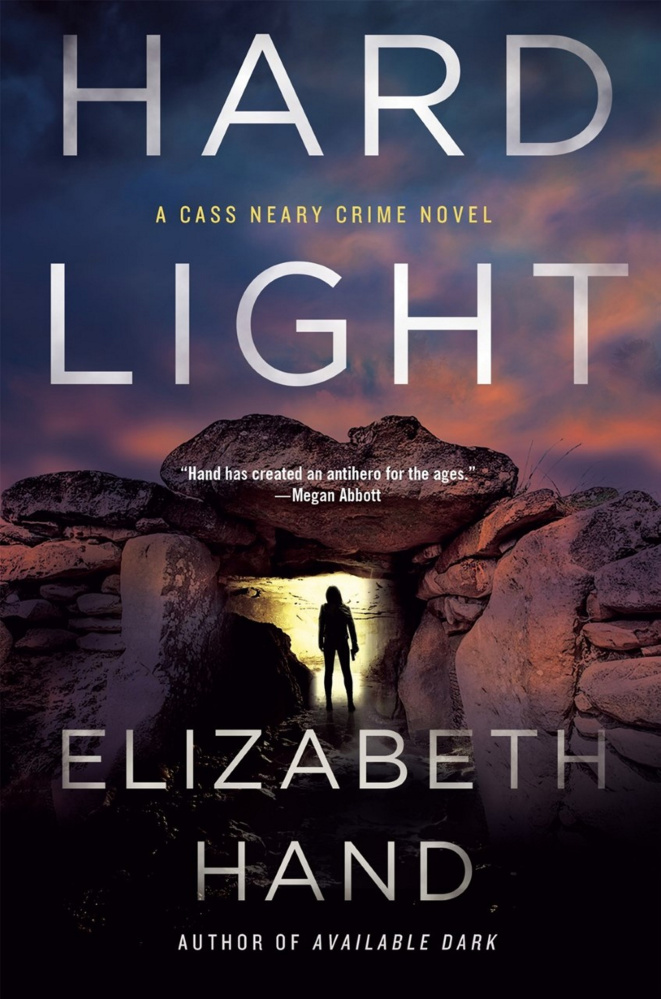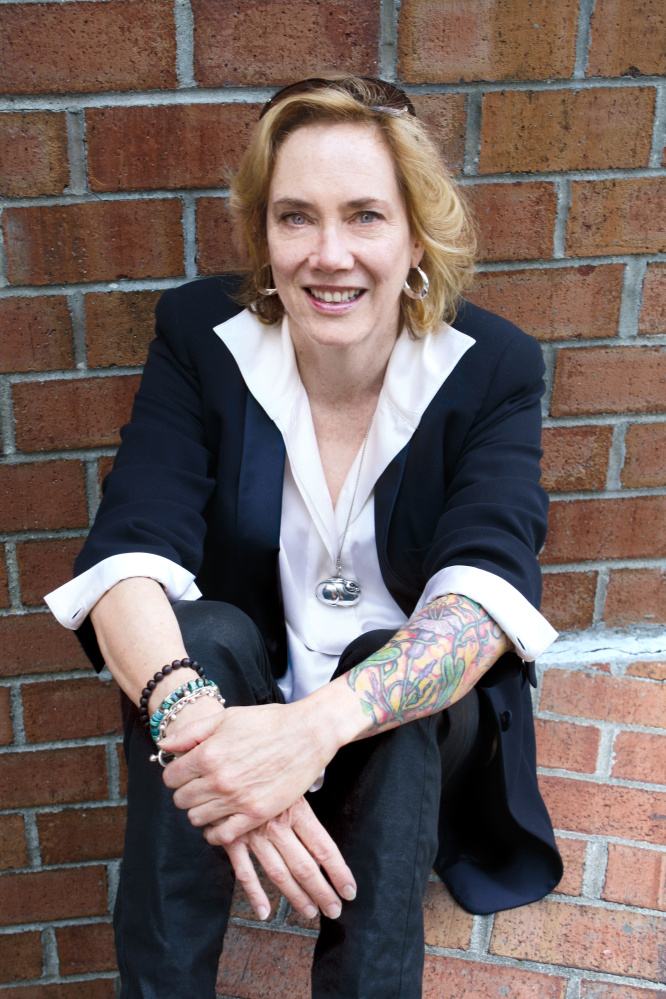How do you like your crime novels? Filled with the atmospherics of a coastal Maine fog or a barren moorish landscape? With a touch of foreboding and a side of the chills? Or do you require the occasional dead body?
Whatever your preference, Elizabeth Hand may be just the ticket. Novelist, book critic and teacher, Hand is one of Maine’s most haunting and versatile writers. A Google search may lead one to conclude that her strong suits are sci-fi and fantasy. And indeed she has won multiple Nebula and World Fantasy Awards to prove that point. Yet her ventures into the realms of magical realism, psychological thrillers and dystopian fiction have hardly gone unnoticed. In the process, this master of the strange and unsettling has accrued yet more recognition and bestsellers.
Hand’s latest offering is “Hard Light,” the third volume in her series featuring infamous aging punk photographer Cass Neary. Following the celebrated “Generation Loss” (2007) and “Available Dark” (2012), “Hard Light” finds our anti-heroine, Cass, up to her usual schemes, with a dark British undercurrent.
Hand, who divides her time between London and the coast of Maine, spoke recently from England about novels, elves, the writer’s life and drugs. This interview has been edited for length and clarity.
Q: You’ve written books and stories in several genres. Is there a particular mood or genre that’s more interesting to you at this stage?
A: When I did “Generation Loss,” that was the first time I had written in that noir style, and it was really difficult to do. But when I finished it, I thought I would like to write something like that again – I enjoyed it. It was such a dark book, and there was not this sort of safety net of the supernatural to work with, so I felt very exposed in a lot of ways. When I finished it, I was like, “Oh my God, I just want to write a story about elves!”
Q: What has it been like hanging out with Cass Neary, in your head and on the page, for 10 years? She’s a lot of trouble.
A: She is a lot of trouble. On the one hand, I feel like I’ve nailed her as far as channeling that voice. I realized I had created this vital, viable character, and a lot of readers love the fact that she’s this total screwup-alcoholic-speed freak.
She’s really out there. But there is an overarching narrative arc, and she is changing as a character. I’m working on the fourth book in the series now, and she gets superficially cleaned up. But it doesn’t last. I don’t want her to harden into schtick, so I’m trying to give her a slightly broader, more complex emotional and psychological palette. But she’s still a freaking mess.
Q: Now that you have a decade of history with this character, do you, as the author, have less control?
A: It almost feels like a form of method acting. I feel like I can project into her whatever I want her to do, or be, that feels, to me, rational. Could I buy this person acting this way? Would I, on my worst possible day, do something like this? If I can say “yes,” then I don’t feel too constrained. She’ll pretty much do anything if she has enough speed or alcohol in her. So it’s very liberating from that perspective. I, personally, do not behave that way.
Q: Well, considering your output with the book reviews, the teaching and the books, how stoned could you be?
A: Exactly. I did enough of it a long time ago that I can draw on the experience for Cass. But once I moved to Maine, in 1988, I had pretty much put all of that behind me. And then I had kids. I’m a totally upstanding member of society – that’s a disappointment to some people.
It’s that whole difference between what people would imagine – the exciting, depraved writer’s life – and the reality of having to be organized and disciplined and a grown-up. I’m not a heavy drinker. I really am a lightweight.
Q: Given what you write about, how do you inoculate yourself against a lifetime of sleepless nights or nightmares?
A: That’s something I’ve just sort of learned. Writing stuff on the page, I can kind of detach myself, so it becomes a technical exercise. I want to do it as well as possible. I like to have a certain detachment, so it doesn’t come across as too schlocky. Just the right amount of schlock!
Q: And what is the right amount of schlock?
A: I think some of my earlier stuff, from 20 or 25 years ago, certainly had more purple prose. I’ve consciously tried to strip that down. In the Cass Neary books, I wanted the story to be told in that very hard-boiled noir voice. But having said that, I cannot watch violence on the screen. I have a really hard time with it. And I have an increasingly hard time reading any true crime accounts.
Q: What makes a great story?
A: Well, from the perspective of a writer, if I make somebody cry at the end, then I know that my work here is done. Or if I know that I’ve succeeded in really disturbing somebody.
As a reader, I guess it’s the same thing. I want to be moved by something. I’m less concerned with being entertained than I am by having a powerful response to something. I’ve been writing professionally for almost 30 years now, and I also do a lot of book reviews, so I spend a lot of time reading. I’m not a big one on plot, in my own writing or when I read. I read more for style and character. But I lose interest in something if it’s not well done.
Q: As a critic, what would you say is the best story that you’ve written?
A: Well, I think I have a lot of them! I think the novellas and the short novels work really well. “Illyria” I love. That, to me, is sort of a perfect little book. Not everyone feels that way about it, I know that. I think “Near Zennor” works really well – also “Cleopatra Brimstone.”
Q: Is part of their success that they’re compressed in length rather than full novels?
A: Yes, absolutely. I think I work much better in a shorter length. Those stories always feel like gifts of the gods. Unlike a novel that feels like the gods are throwing rocks at your head!
Q: Is the novel a torturous form for you?
A: I wouldn’t say it’s torturous; I’d say it’s really difficult. I find it very challenging to write a novel. Starting out, I always think, “Oh, this time will be different.” And then I get midway through it, and I’m like, “Oh, no, it’s not; I remember now what this is like.”
Q: And here you are, just as “Hard Light” is coming out, already working on the fourth book in the series? You’re a glutton for punishment!
A: Well, baby needs snowshoes!
Q: How will you know when you’ve reached the end of the series?
A: It will come down to two things: If I lose interest, or if readers lose interest – either of those would certainly be a death knell. I have no plans to kill her off, though. I’ll let Cass do that, without any help from me.
Q: Is there possibly a memoir in your future?
A: No, I don’t think so. My autobiography is kind of spelled out in my books and stories. I feel like I’ve been able to dispense with that in my fiction. I don’t have any compulsion to talk about my life. If my life was more interesting, I wouldn’t be making stuff up for a living.
Joan Silverman writes op-eds, essays and book reviews. Her work has appeared in The Christian Science Monitor, Chicago Tribune and Dallas Morning News.
Send questions/comments to the editors.




Success. Please wait for the page to reload. If the page does not reload within 5 seconds, please refresh the page.
Enter your email and password to access comments.
Hi, to comment on stories you must . This profile is in addition to your subscription and website login.
Already have a commenting profile? .
Invalid username/password.
Please check your email to confirm and complete your registration.
Only subscribers are eligible to post comments. Please subscribe or login first for digital access. Here’s why.
Use the form below to reset your password. When you've submitted your account email, we will send an email with a reset code.